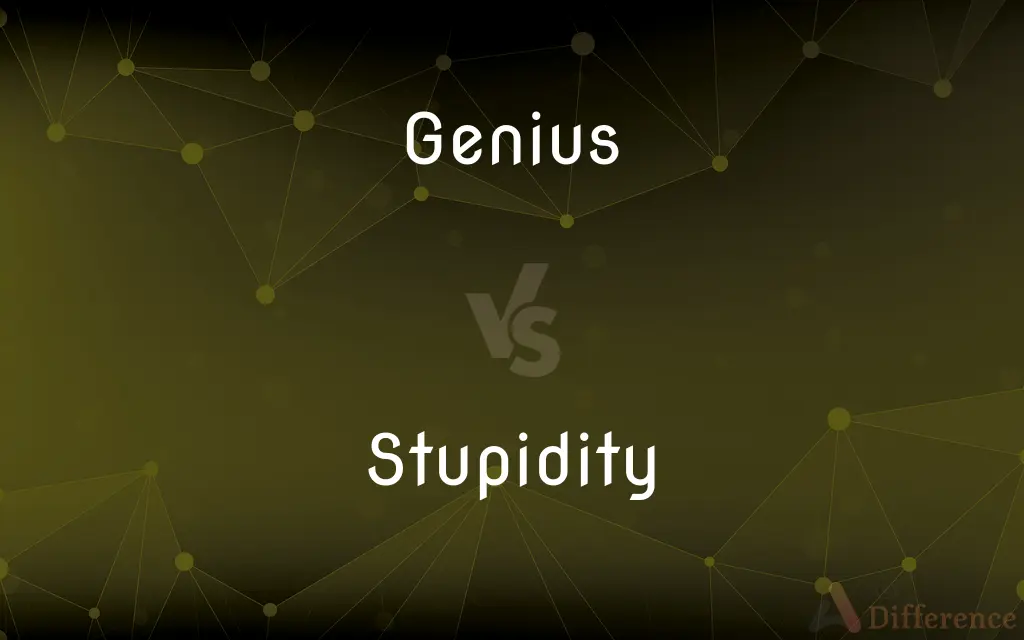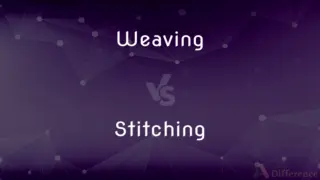Genius vs. Stupidity — What's the Difference?
By Urooj Arif & Fiza Rafique — Updated on April 20, 2024
Genius implies exceptional intellectual ability, creativity, or insight, often linked to achievements in scholarly domains; stupidity, on the other hand, denotes a lack of intelligence or common sense, typically resulting in poor decision-making.

Difference Between Genius and Stupidity
Table of Contents
ADVERTISEMENT
Key Differences
Genius is characterized by an exceptional level of intelligence or creativity, often used to describe individuals who contribute groundbreaking ideas or solutions in their fields. Stupidity, whereas, is typically marked by actions or decisions that reflect a lack of understanding, foresight, or rational judgment.
Individuals considered geniuses are often noted for their innovative thinking and ability to solve complex problems that might stump others. On the other hand, actions deemed stupid are usually those that ignore obvious information or logical reasoning, leading to ineffective or counterproductive outcomes.
While genius often leads to significant achievements or advances, such as scientific breakthroughs or masterpieces in art, stupidity tends to result in errors, failures, or mishaps, negatively impacting one's personal or professional life.
The societal perception of genius usually includes admiration and respect, viewing such individuals as assets to their communities or humanity at large. In contrast, stupidity is often met with frustration or ridicule, and can hinder personal or social progress.
Educational and developmental environments aim to nurture genius by promoting critical thinking and innovation. Conversely, these settings also strive to mitigate stupidity by emphasizing the importance of knowledge, logic, and sensible decision-making.
ADVERTISEMENT
Comparison Chart
Definition
High intellectual capacity and originality
Lack of intelligence or common sense
Societal Perception
Admired and respected
Often ridiculed or viewed negatively
Typical Outcomes
Breakthroughs, innovations
Mistakes, poor decisions
Role in Problem-solving
Effective in finding solutions
Often contributes to complications
Influence on Progress
Drives advancement and development
Can impede personal and social progress
Compare with Definitions
Genius
Extraordinary intellectual power especially as manifested in creative achievement.
The scientist’s theory was a work of genius that revolutionized physics.
Stupidity
Behavior that shows a lack of good sense or judgment.
His decision to ignore the warning signs was pure stupidity.
Genius
Great natural ability in a particular area.
Her genius in architectural design is evident in the innovative buildings she creates.
Stupidity
Dullness of mind.
The movie's plot relies too heavily on the stupidity of its characters.
Genius
An exceptional talent for creative or inventive thought or activity.
His genius in problem-solving makes him an invaluable member of the team.
Stupidity
An act or idea that lacks intelligence or sense.
Investing in that obviously failing business was an act of stupidity.
Genius
A person who influences another for good or bad.
He was regarded as the artistic genius of his generation.
Stupidity
A state of being slow to understand or to profit from experience.
His repeated mistakes at work are attributed to sheer stupidity.
Genius
A person endowed with exceptional natural capacity of intellect.
A child prodigy often displays signs of genius from a very young age.
Stupidity
The quality of being stupid or unintelligent.
The plan failed due to the sheer stupidity of its execution.
Genius
A genius is a person who displays exceptional intellectual ability, creative productivity, universality in genres, or originality, typically to a degree that is associated with the achievement of new discoveries or advances in a domain of knowledge. Geniuses may be polymaths who excel across many diverse subjects or may show high achievements in only a single kind of activity.There is no scientifically precise definition of a genius.
Stupidity
Stupidity is a lack of intelligence, understanding, reason, or wit. It may be innate, assumed or reactive.
Genius
Extraordinary intellectual and creative power
Artistic works of genius.
Stupidity
The quality or condition of being stupid.
Genius
A person of extraordinary intellect and talent.
Stupidity
A stupid act, remark, or idea.
Genius
A person who has an exceptionally high intelligence quotient, typically above 140.
Stupidity
(uncountable) The property of being stupid.
I suppose you can put it down to gross stupidity, but that's not much of an excuse.
Genius
A strong natural talent, aptitude, or inclination
Has a genius for choosing the right words.
Stupidity
(countable) An act that is stupid.
Jimmy's stupidity cost him his car.
Genius
One who has such a talent or inclination
A genius at diplomacy.
Stupidity
The quality or state of being stupid; extreme dullness of perception or understanding; insensibility; sluggishness.
Genius
The prevailing spirit or distinctive character, as of a place, a person, or an era
The genius of Elizabethan England.
Stupidity
Stupor; astonishment; stupefaction.
A stupidityPast admiration strikes me, joined with fear.
Genius
Pl. ge·ni·i (jēnē-ī′) Roman Mythology A tutelary deity or guardian spirit of a person or place.
Stupidity
A poor ability to understand or to profit from experience
Genius
Someone possessing extraordinary intelligence or skill; especially somebody who has demonstrated this by a creative or original work in science, music, art etc.
Idiot savant
Stupidity
A stupid mistake
Genius
Extraordinary mental capacity.
Genius
Inspiration, a mental leap, an extraordinary creative process.
A work of genius
To add a dash of cinnamon amid such umami was pure genius
Genius
The tutelary deity or spirit of a place or person.
And the genius of the place: the growing enthusiasm for codified standards in the Army and Navy
Genius
(informal) Ingenious, brilliant, very clever, or original.
What a genius idea!
Genius
A good or evil spirit, or demon, supposed by the ancients to preside over a man's destiny in life; a tutelary deity; a supernatural being; a spirit, good or bad. Cf. Jinnee.
The unseen genius of the wood.
We talk of genius still, but with thought how changed! The genius of Augustus was a tutelary demon, to be sworn by and to receive offerings on an altar as a deity.
Genius
The peculiar structure of mind with which each individual is endowed by nature; that disposition or aptitude of mind which is peculiar to each man, and which qualifies him for certain kinds of action or special success in any pursuit; special taste, inclination, or disposition; as, a genius for history, for poetry, or painting.
Genius
Peculiar character; animating spirit, as of a nation, a religion, a language.
Genius
Distinguished mental superiority; uncommon intellectual power; especially, superior power of invention or origination of any kind, or of forming new combinations; as, a man of genius.
Genius of the highest kind implies an unusual intensity of the modifying power.
Genius
A man endowed with uncommon vigor of mind; a man of superior intellectual faculties and creativity; as, Shakespeare was a rare genius.
Genius
Someone who has exceptional intellectual ability and originality;
Mozart was a child genius
He's smart but he's no Einstein
Genius
Unusual mental ability
Genius
Someone who is dazzlingly skilled in any field
Genius
Exceptional creative ability
Genius
A natural talent;
He has a flair for mathematics
He has a genius for interior decorating
Common Curiosities
Is stupidity always inherent?
Not necessarily; it can also be situational or the result of a lack of exposure to information or education.
What defines a genius?
Genius is typically defined by extraordinary mental capacity and creative ability that leads to significant achievements or innovations.
Can stupidity be overcome?
Yes, with education and experience, one can overcome acts of stupidity by developing better judgment and knowledge.
Do geniuses always succeed?
Not always; while geniuses have the potential for significant achievements, they can also face challenges like social misunderstanding or personal struggles.
Can anyone become a genius?
While everyone can improve their cognitive and creative skills, the level of genius involves a combination of innate ability and environmental factors that is rare.
What role does environment play in developing a genius?
Environment plays a crucial role by providing the resources, stimulation, and support needed to nurture and develop potential geniuses.
How do societies benefit from geniuses?
Societies benefit from geniuses through technological advancements, cultural enrichment, and scientific breakthroughs that improve quality of life.
Are all smart decisions made by geniuses?
No, smart decisions can be made by anyone who applies intelligence and reason, not just those classified as geniuses.
How does stupidity affect decision-making?
Stupidity can lead to poor decision-making by ignoring critical information or failing to apply logic.
What can lead to acts of stupidity?
Factors include lack of knowledge, ignorance of critical information, or emotional decisions that cloud judgment.
What are common traits of a genius?
Common traits include creativity, curiosity, perseverance, and the ability to think abstractly and solve complex problems.
How are geniuses perceived in academia?
In academia, geniuses are often revered and play pivotal roles in pushing the boundaries of knowledge and research.
Is stupidity linked to education?
While education can mitigate instances of stupidity by providing knowledge and critical thinking skills, stupidity is not solely determined by educational level.
Can stupidity be beneficial in any way?
Rarely, as it generally leads to negative outcomes, but it can sometimes provide learning opportunities or creative solutions through unconventional thinking.
How does society handle stupidity?
Societies typically try to reduce stupidity through education, public awareness campaigns, and promoting rational thought in decision-making processes.
Share Your Discovery

Previous Comparison
Weaving vs. Stitching
Next Comparison
Biathlon vs. TriathlonAuthor Spotlight
Written by
Urooj ArifUrooj is a skilled content writer at Ask Difference, known for her exceptional ability to simplify complex topics into engaging and informative content. With a passion for research and a flair for clear, concise writing, she consistently delivers articles that resonate with our diverse audience.
Co-written by
Fiza RafiqueFiza Rafique is a skilled content writer at AskDifference.com, where she meticulously refines and enhances written pieces. Drawing from her vast editorial expertise, Fiza ensures clarity, accuracy, and precision in every article. Passionate about language, she continually seeks to elevate the quality of content for readers worldwide.
















































